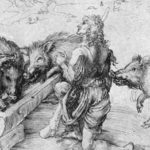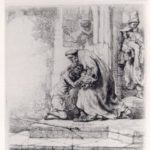When the long-expected words came, the sting of them stole his breath.“Father, I cannot stay any longer.” The boy was a delight: free, adventurous, always joking, always smiling. But those traits that made him so easy to love—and to like—were the very things that now pulled him away. “I want to live,” the boy said, dragging out and emphasizing the live. “I want my inheritance. Now.”
And in living, the father thought, he puts me in my grave. Like a butcher’s razor-sharp knife, his son’s words cut deep into his soul. He gasped for breath, steadying himself on the table as strength nearly left his legs. The labored pulsing of his heart masked the shame he ought to have felt at his son’s rejection. With his free hand, he reached for the boy’s shoulder and drew him close. No arms encircled the broken, weeping man. Weakly, he called a servant and gave the order to divide the flocks. The servant, feeling his master’s shame, did not look in his eyes.
Dark nights passed in sleepless misery. With each new dawn, he stood scanning the distant horizons, hoping beyond hope the nightmare was over and he would see his son’s silhouette against the sunrise. At dusk, he stood again — staring, wishing, longing.
The boy had run away once before, when he was young. Scarcely taller than a ewe, he’d wrapped a few loaves and some fish in a bag, scrawled a note, and set out. He was gone some hours; but before dinner his mother found him, sitting on a rock with his arms around his knees, looking over the swollen Jordan. “I can’t swim,” was all he’d said, before walking home, hand in hand with her.
Now the father sat often on that same rock, staring across the fabled waters. As the days drew into weeks and the weeks to months, he’d sent messengers throughout Judea in search of his youngest. Always they’d returned, unable to meet his hope-filled eyes. East, across the Jordan, in the land of Perea…perhaps this is where his son had gone.
Meals were quiet now. His wife and younger son had always made the table a lively place, but she had died long ago and now… now it was just he and Reuben, his older, ever-faithful son. Reuben reported on the condition of the flocks, where the best grazing lands were now, where the wolves were attacking lately. He’ll do well when I’m gone, the father thought. He choked on the final word. Gone? I am already gone; my boy has taken my life. It was right for Reuben to keep account; after all, all that remained was his—or would be, when his father was at last buried next to his wife.
Buried. A final resting place. A place to mourn, but also to remember. He had sat Shiva for his wife—the seven days of mourning Moses had commanded—but had returned often to her tomb when being a single father to two boys had gotten the better of him. There he remembered her smile, her gentleness, her wisdom. There he found the grace to love when the boys fought, to forgive when they wronged him.
He’d gone often, almost daily, these past months. Now his son, too, was dead—must be dead—but there was no tomb for him, and so no place from which to remember. And it was from there that he looked up and saw the specter in the distance: an emaciated and tattered figure, empty handed and bare footed, head hung low.
And the old man ran….
This is Part III in a series looking at the story of the Prodigal Son. Find parts I & II here:
Part I: It Wasn’t Hard to Leave That Day
Part II: Alone with the Pigs

 (This is Part 2 in a story of the prodigal son.
(This is Part 2 in a story of the prodigal son.  It wasn’t hard to leave that day. The conversation was awkward—”Dad, I want my share. Now, please.”—but walking away wasn’t hard. There wasn’t much to take; less to leave behind. He’d never fit, anyway. The work, the animals, the quiet but grueling life of a nomadic sheepherder. Adventure called, and the city they’d passed two days earlier. No, it wasn’t hard to leave that day.
It wasn’t hard to leave that day. The conversation was awkward—”Dad, I want my share. Now, please.”—but walking away wasn’t hard. There wasn’t much to take; less to leave behind. He’d never fit, anyway. The work, the animals, the quiet but grueling life of a nomadic sheepherder. Adventure called, and the city they’d passed two days earlier. No, it wasn’t hard to leave that day.